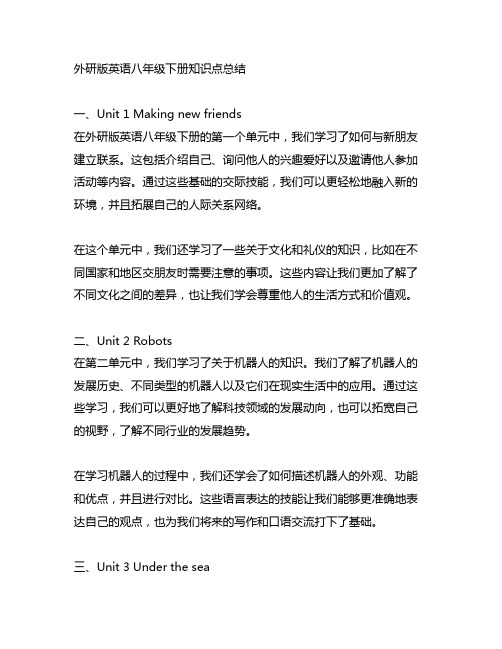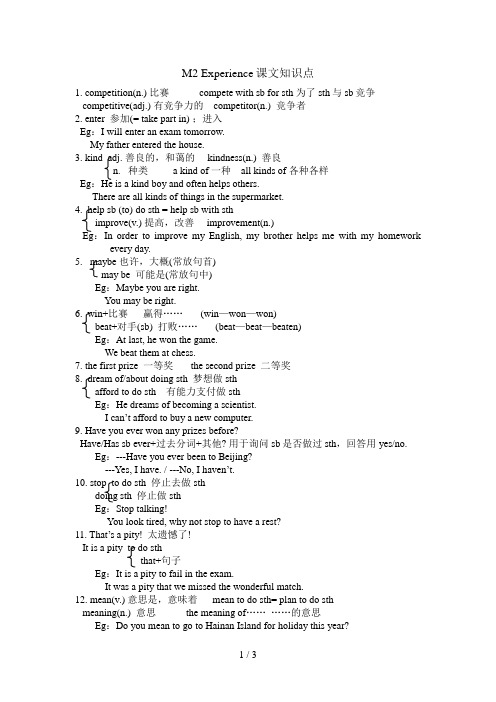最新外研版英语八年级下册知识点总结
外研版英语八年级下册知识点总结

外研版英语八年级下册知识点总结一、Unit 1 Making new friends在外研版英语八年级下册的第一个单元中,我们学习了如何与新朋友建立联系。
这包括介绍自己、询问他人的兴趣爱好以及邀请他人参加活动等内容。
通过这些基础的交际技能,我们可以更轻松地融入新的环境,并且拓展自己的人际关系网络。
在这个单元中,我们还学习了一些关于文化和礼仪的知识,比如在不同国家和地区交朋友时需要注意的事项。
这些内容让我们更加了解了不同文化之间的差异,也让我们学会尊重他人的生活方式和价值观。
二、Unit 2 Robots在第二单元中,我们学习了关于机器人的知识。
我们了解了机器人的发展历史、不同类型的机器人以及它们在现实生活中的应用。
通过这些学习,我们可以更好地了解科技领域的发展动向,也可以拓宽自己的视野,了解不同行业的发展趋势。
在学习机器人的过程中,我们还学会了如何描述机器人的外观、功能和优点,并且进行对比。
这些语言表达的技能让我们能够更准确地表达自己的观点,也为我们将来的写作和口语交流打下了基础。
三、Unit 3 Under the sea第三单元让我们深入了解了海洋生物的知识,比如不同种类的鱼类、海洋植物、以及生活在海洋里的各种生物。
通过学习这些内容,我们可以更好地认识到保护海洋环境的重要性,也让我们了解了自然界的神奇与多样性。
我们在这个单元中也学会了如何描述海底世界的景象,并且学会了使用形容词和副词来增加句子的丰富度。
这些技能对于我们的写作和口语表达都非常重要,可以让我们的语言更加生动和精彩。
四、Unit 4 Wild animals在这个单元,我们学习了如何描述野生动物、它们的特点及栖息环境。
通过对野生动物的了解,我们可以更好地保护和珍惜自然资源,也可以更深入地了解动物世界的精彩之处。
我们还学会了如何表达对动物的喜爱和保护之情,如何呼吁他人一起来保护野生动物。
这些内容培养了我们的社会责任感和环保意识,也让我们学会用语言来表达自己的观点和态度。
外研版八年级英语下全册知识点

外研版八年级英语下全册知识点Module1 Feelings and impressions【重点短语】1. look sb. in the eye 正视某人2. look+形容词看上去…3. be afraid that +从句恐怕…be afraid to do sth 害怕做某事be afraid of doing sth 害怕……4. thank (sb ) for doing sth 因某人做某事而感谢thank(sb) for sth 因…感谢某人5. can’t wait to do sth 迫不及待做某事6. spend 时间/金钱+(in)doing sth. 某人花时间/金钱做…spend 时间/金钱+on sth. 某人在某方面花时间/金钱7. be proud of…以…为自豪8. be proud to do sth. 为做某事而感到自豪9. be proud that…为……感到自豪10. hear from/ receive a letter from... 收到......的来信11. each other 互相,彼此12. arrive in/at 到达13. be good at 擅长,善于14. have a try 尝试15. on top 在上面,处于优势16. in the middle 在中间17. as well 也;还18. in the right way 以正确的方式19. be excited about 对...兴奋20. shake hands 握手21. close to 离......近【重点句型】1. 它闻起来不新鲜。
It doesn’t smell fresh.2. 每种东西都(尝起来)甜滋滋的。
Everything tastes so sweet.3. 多好闻的味道啊!What a delicious smell.4. ——你想来点尝尝吗?——好的,谢谢。
外研版八年级下册+英语M2+Experience课文知识点

M2 Experience课文知识点1. competition(n.) 比赛 compete with sb for sth 为了sth与sb竞争competitive(adj.) 有竞争力的 competitor(n.) 竞争者2. enter 参加(= take part in) ;进入Eg:I will enter an exam tomorrow.My father entered the house.3. kind adj. 善良的,和蔼的 kindness(n.) 善良n. 种类 a kind of 一种 all kinds of 各种各样Eg:He is a kind boy and often helps others.There are all kinds of things in the supermarket.4. help sb (to) do sth = help sb with sthimprove(v.) 提高,改善 improvement(n.)Eg:In order to improve my English, my brother helps me with my homework every day.5. maybe 也许,大概(常放句首)may be 可能是(常放句中)Eg:Maybe you are right.You may be right.6. win+比赛赢得…… (win—won—won)beat+对手(sb) 打败…… (beat—beat—beaten)Eg:At last, he won the game.We beat them at chess.7. the first prize 一等奖 the second prize 二等奖8. dream of/about doing sth 梦想做sthafford to do sth 有能力支付做sthEg:He dreams of becoming a scientist.I can’t afford to buy a new computer.9. Have you ever won any prizes before?Have/Has sb ever+过去分词+其他? 用于询问sb是否做过sth,回答用yes/no.Eg:---Have you ever been to Beijing?---Yes, I have. / ---No, I haven’t.10. stop to do sth 停止去做sthdoing sth 停止做sthEg:Stop talking!You look tired, why not stop to have a rest?11. That’s a pity! 太遗憾了!It is a pity to do sththat+句子Eg:It is a pity to fail in the exam.It was a pity that we missed the wonderful match.12. mean(v.) 意思是,意味着 mean to do sth= plan to do sthmeaning(n.) 意思 the meaning of…………的意思Eg:Do you mean to go to Hainan Island for holiday this year?13. 动词不定式to do 结构在句中可以作目的状语之外,还可以作宾语、宾语补足语。
八年级下学期-英语-知识点总结(外研版)

八年级下册知识梳理1.动词时态2.并列复合句3.宾语从句2、并列复合句并列复合句----是由并列词and ,but ,or 等把两个或者两个以上的简单句连在一起而构成的句子。
并列复合句的构成:简单句+并列连词+简单句。
并列连词前后简单句之间的关系。
(1)并列关系用and(2)选择关系用or(3)转折关系用but3、宾语从句1.引导词的选择 陈述句充当宾语从句一般疑问句充当宾语从句thatif/whether特殊疑问句充当宾语从句疑问代词或疑问副词2.语序 陈述句语序3.时态4.当主句谓语动词为think ,suppose , expect ,believe等时,其后的宾语从句为否定句时,常将否定词not 从从 句中移到主句中,构成否定转移5.如果从句说的是客观现象或真理,无论主句是什 么时态,从句都用一般现在时。
直接引语变间接引语与宾语从句的关系1.陈述句变为引导的宾语从句e.g.He said, “You are younger than I ”.He said that I was youngerthan him.2. He says, “Tom is a good student ”.He says that Tom is a goodstudent.直接引语变间接引语与宾语从句的关系2.特殊疑问句引导的宾语从句e.g.1. He asked, “Wh ere do you live?”He asked where I lived.2. “How can we get to the post-office?” heasked.He asked how they could get to thepost-office.直接引语变间接引语与宾语从句的关系3.一般疑问句引导的宾语从句1. She said, “ Do you often come here to read”She asked if (whether) I often came hereto read newspaper.2. “Will they go to visit the Great Wall?” he asked.He asked if (whether) they would go tovisit the Great Wall.二、话题1.人的相貌及性格2.天气及季节3.看病与健康4.假期简单句并列句复合句三、选择问句句特殊疑问句子感叹句一般疑问句否定句祈使句This is an orange bike.He knows me and Iknowhim. When Iwas 5, I could swim. Did you live here or t here? What d id they learn just now?What a heavy rain it is!Does Tom speak French? I don ’t understand it.Stand (Don’t ) up.1.对某人来说做某事是怎么样的:It is +adj. for/of sb. + to do sth.2. 提问看病的:What can I do for you ?Can I help you ?What’s wrong?What’s the matter?3.回答生病情况:1)I have got acatch a cold headache . stomach ache . toothache. fever.cough.cold.2) 就此病症提出合理建议•Take / Have some / these medicine three times a day.•Drink more water and stay in bed for a few days.•It’s nothing serious.•Y ou’ll be / get / become OK / well soon/ in one or two days.•Don’t be so tired.4.提问某人的爱好:What ’s your hobby?collecting fans/tickets.collecting stamps/model cars.回答爱好:My hobby is writing.playing basketball.swimming. running.singing.5. 提问人的相貌:What does...look like?6. 提问人的性格:What is ... like?7. 到该做什么事的时候了。
新外研版八年级英语(下册)重点知识点总结

外研版八年级英语下册重点知识点Module1语法:系动词:一是(be:am,is,are,been,was,were),一觉得(feel),一好像(seem),一保持(keep),三变化(turn,become,get),四起来(smell,sound,look,taste),后跟形容词..11.三到达:arriveat(小地方),arrivein(大地方),getto=reach注意:跟home,here,there等副词时,不加介词.12.quite相当,很,相当于very,区别,quitea../quitean..而very只能放在a/an后13.with有,带有;和…一起;使用等.反义词without14.lovely:令人愉快的,可爱的修饰人或物alovelyafternoon/girllively:活泼的,生动的alivelylesson:一堂生动的课16.四个花费:take:Ittakessb.sometimetodosth./Ittooksb.sometimetodosth.Spend:Sb.spendsometime/moneyonsthSb.spendsometime/money(in)doingsth.Pay:Sb.paysomemoneyforsth.cost:sthcostsb.somemoney.,暗示.注意:词数70左右。
Ihaveanetfriend.SheisfromSydney,Australia.Thegirlisfifteenyearsold.Sheisthinwithtwo bigeyes.Shehaslongfairhair.Sheisfriendlyandoutgoing.Shealwayshasabigsmileonherface.S helikesreadingandchattingontheInternetwithherfriends.Shesaidthatreadingmadehergrowup asaperson.IfeelveryhappywhenIchatwithher.Ilikemynetfriendverymuch.IhopeIcangotoSyd neytoseeheroneday.Module2语法:现在完成时:表过去发生或已经完成的某一动作,对现在造成的影响和结果,或持续到现在的动作。
八年级下册外研版英语知识点

八年级下册外研版英语知识点
以下是八年级下册外研版英语的部分知识点:
1. 动词不定式:在英语中,动词不定式是一种形式,它表示动作或状态,但不定式通常出现在句子的谓语动词之前。
例如,“to go to the movies”表示“去看电影”。
2. 情态动词:情态动词是英语中表示可能性、必要性和意愿的动词,如“can”、“should”、“must”等。
3. 介词:介词用于表示名词或代词与句子其他部分之间的关系,如“in”、“on”、“at”等。
4. 连词:连词用于连接两个或多个句子或从句,以表示它们之间的关系,如“and”、“but”、“or”等。
5. 代词:代词用于代替名词或名词短语,以避免重复,例如“she”、“he”、“it”等。
6. 副词:副词用于描述动词、形容词或其他副词的程度、方式或时间,例如“happily”、“very”、“usually”等。
7. 冠词:冠词用于限定名词,表明其类别或范围,例如“a”、“an”、“the”。
8. 时态:时态是表示动作发生的时间和方式的语法形式,例如“现在进行时”、“过去完成时”、“将来时”等。
9. 被动语态:被动语态是表示动作的承受者而不是执行者的语法形式,例如“The book is written by him.”。
10. 宾语从句:宾语从句是一个完整的句子作为另一个句子的宾语,通常由连词引导,例如“I know that he is a teacher.”。
希望以上内容对您有帮助。
建议查阅课本和练习册获取更多详细和具体的内容。
最新外研版英语八年级下册知识点总结

3.would like比want语气更委婉。I heard from my uncle last week.
----Would you like to stay here with us?= I got / received a letter from my uncle last week.
have a swim:游泳
物上
have a break:休息I spent ten yuan on this book.
have a shower:洗沐浴Many people spned their free time on their hobbies.
8.I have a sweet tooth.我喜欢吃甜食。8. be proud of sb. / sth. :以某人/某事为自豪
1.What a delicious smell?Smell:一股气味(可数名词)2. message:口信、信息(可数名词)
_____ good advice!It’s so helpful to us. (what / How)take a message:捎个口信
_____ interesting the story is! (What / How)leave a message:留信
3.how to do things:疑问词+不定式,在句中可作主语、宾语、表classmates with the homework. He also helps old woman cross the
语road. He is kind to others. He works at the Helping Hands Club. He
八年级下册外研版英语知识点

八年级下册外研版英语知识点
八年级下册外研版英语的知识点包括但不限于以下内容:
1. 时态:一般现在时、一般过去时、一般将来时、现在进行时、过去进行时、现在完成时、过去完成时等;
2. 语法:动词的时态、语态和非谓语动词的用法(不定式、动名词、现在分词、过去分词);
3. 名词:可数名词和不可数名词、单数和复数形式、所有格等;
4. 代词:人称代词、物主代词、反身代词、不定代词等;
5. 形容词和副词:形容词的比较级和最高级、副词的比较级和最高级、形容词和副词的用法等;
6. 情态动词:can、could、may、might、must、shall、should、will、would等;
7. 定冠词和不定冠词的用法;
8. 冠词和名词的搭配用法;
9. 介词和介词短语的用法;
10. 等比较级和最高级;
11. 疑问句和感叹句的构成;
12. 各类从句:宾语从句、主语从句、定语从句、表语从句、
状语从句等;
13. 动词的被动语态的构成;
14. 祈使句的构成和用法;
15. 直接引语和间接引语;
16. 情景对话和口语交际用语;
17. 阅读理解:短文、文章和图表等;
18. 书面表达:写信、写作文、简单的应用文等。
以上是八年级下册外研版英语的一些主要知识点,具体的内容和难度可能会有所调整,请根据课本的内容和教师的要求进行学习。
- 1、下载文档前请自行甄别文档内容的完整性,平台不提供额外的编辑、内容补充、找答案等附加服务。
- 2、"仅部分预览"的文档,不可在线预览部分如存在完整性等问题,可反馈申请退款(可完整预览的文档不适用该条件!)。
- 3、如文档侵犯您的权益,请联系客服反馈,我们会尽快为您处理(人工客服工作时间:9:00-18:30)。
周效冰小美女最新外研版英语八年级下册知识点总结Module 1 Feelings and impressionsUnit 11. What a delicious smell? Smell:一股气味(可数名词)_____ good advice! It’s so helpful to us. (what / How)_____ interesting the story is! (What / How)2. nice:adj. 美味的,友好的,令人愉快的nice weather: 好天气be nice to sb.:对某人友好a nice trip: 一次令人愉快的旅行The cookie tastes nice. 这块饼干尝起来美味。
3. would like 比want 语气更委婉。
----Would you like to stay here with us?---- Yes, I’d like / love to.4. lovely: 令人愉快的,可爱的修饰人或物a lovely afternoon / girllively: 活泼的,生动的a lively lesson:一堂生动的课5. I’m afraid that + 从句: 恐怕(表示歉意或让对方失望的情况)I’m afraid that I can’t come to your party tomorrow.6. 1) a bit = a little:有点儿,有点后接/形容词/副词\形容词/副词的比较级I feel a bit thirsty now.After the rain, people feel a bit / a little cooler.2) a little + 不可数名词:There is a little time left.a bit of + 不可数名词:There is a bit of water in the bottle.7. have a try: 试一试have a / an + 名词have a swim:游泳have a break:休息have a shower:洗沐浴8. I have a sweet tooth. 我喜欢吃甜食。
9. be done: 做好了,完成了done: adj. 做好了的,完成了10. be sure + 从句:Are you sure what you said?Be sure of / about sth.: 对……确信I’m sure of / about the telephone number.be sure (not) to do. Sth.: 确保/ 务必(不)做某事Be sure not to miss the early bus.11. lucky day:幸运日You’re a lucky boy. 你是一个幸运儿。
Good luck to you. 祝你好运。
Unit 21. thanks for = thank you for: 因……而感谢你Thank you for your help.Thank you for sending me photos. 2. message: 口信、信息(可数名词)take a message:捎个口信leave a message:留信Information: 信息(不可数名词)a piece of information ,some information3. hear from sb.= get / receive a letter from sb. : 收到某人的来信I heard from my uncle last week.= I got / received a letter from my uncle last week.4. can’t wait to do sth. : 等不及/ 迫不及待做某事I can’t wait to open the present.5. quite:1) quite a / an + 形容词+ 名词quite a nice boy:一个相当好的男孩。
2) quite 修饰动词时放在动词前He quite likes maths. 他很喜欢数学。
very:1) a very + 形容词+ 名词a very nice boy2) very 与much合在一起修饰动词时,位于句末。
He likes English very much.6. sound like: 听起来(像)The music sounds very beautiful.7. 1) sb. spend some time/money (in) doing sth.:某人花费时间/钱做某事Don’t spend too much time (in) playing computer games.2) sb. spend some time / money on sth. :某人花时间/ 钱在某事/某物上I spent ten yuan on this book.Many people spned their free time on their hobbies.8. be proud of sb. / sth. : 以某人/ 某事为自豪Parents are proud of their children.We’re proud of our country.9. be good at sth. / doing sth.= do well in sth. / doing sth. 擅长某事/ 做某事I’m good at English / swimming.= I do well in English / swimming.10. How do you feel about…?= What do you think of …?= How do you like…?How do you feel about the film?= What do you think of the film?11. in: 在多久之后,常用于将来时,对其提问用how soon--- How soon will you leave Beijing?--- I’ll come back in three days.12. how to do things: 疑问词+ 不定式,在句中可作主语、宾语、表语1) I do n’t know what to do.= I don’t know what I should do. (作宾语)疑问词加不定式作宾语时可以转换成宾语从句。
2) When to hold the meeting hasn’t been decided. (作主语)3) His dream is how to be a good scientist. (作表语)4) I don’t know what to do.= I don’t know how to do it.13. 1) be afraid of sb. / sth. : 害怕某人/某物I’m afraid of doctors / dogs.2) be afraid of doing sth.: 害怕做某事I’m afraid of flying / going out at night.3) be afraid to do sth.: 害怕做某事I’m afraid to swim across the river.4) I’m afraid that: 恐怕I’m afraid that you must stu dy hard.语法:表示感觉和知觉的系动词也称感官系动词1. 五个表示感觉和知觉的系动词与眼、耳、口、鼻、手相关系。
look, sound, taste, smell, feel + 形容词He feels tired after work.2. 感官系动词后可接介词like, like后常接名词。
His idea sounds like fun .3. 感官系动词的句型结构与be 不同,其否定形式和疑问形式要借助动词do。
The food tastes delicious.变成否定句→ The food doesn’t taste delicious.变成一般疑问句→ Does the food taste delicious?4. 持续系动词,用来表示主语继续或保持一种状况或态度,主要有keep, remain, stayThe weather will keep warm for 7 days.5. 变化系动词有become, grow, turn, get, go等。
书面表达在英语学习中,与北京阳光中学的同学朝夕相处,其中Daniel的善良和助人为乐等优秀品质给我们留下了深刻的印象。
请根据下面提示,用英语写一篇短文。
提示:1.Personality: helpful—help old woman cross the road kind—work at the Helping Hands Clubcreative—creative a TV programme点拨:人物介绍(年龄、外貌、身份、性格)→ 典型事例(性格、品质)→人物评价(喜爱、夸赞)My friend DanielMy friend Daniel comes from Beijing Sunshine Secondary School. He has a round face and often wears a pair of glasses. He is good at playing computer games, but he dislikes sports. He has many good personal qualities. He is helpful. He often helps his classmates with the homework. He also helps old woman cross the road. He is kind to others. He works at the Helping Hands Club. He is creative. For example, he can create a TV programme. He is generous to his friends. He likes to share his things with them. So I want to be a person like Daniel from now on and get on well with everyone.Module 2 ExperiencesUnit 11. 1) enter = take part in = join in 参加enter a competition: 参加比赛2) enter = come / go into 进入Please enter the classroom.2. ever: 曾经、从来,用于现在完成时的一疑问句、否定句。
